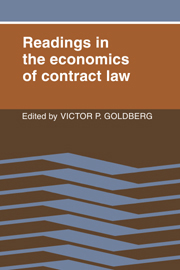Book contents
- Frontmatter
- Contents
- Preface
- Readings in the economics of contract law
- Part I Some preliminaries
- Part II Contract law and the least cost avoider
- Part III The expectation interest, the reliance interest, and consequential damages
- 3.1 The reliance interest in contract damages
- 3.2 Note on price information and enforcement of the expectation interest
- Questions and notes on protecting the property interest in the price
- 3.3 The contract–tort boundary and the economics of insurance
- 3.4 Notes on the reliance interest
- Questions and notes on fault, consequential damages, and reliance
- Part IV The lost-volume seller puzzle
- Part V Specific performance and the cost of completion
- Part VI Power, governance, and the penalty clause puzzle
- Part VII Standard forms and warranties
- Part VIII Duress, preexisting duty, and good faith modification
- Part IX Impossibility, related doctrines, and price adjustment
- Questions and notes on impossibility and price adjustment
- References
- Index of cases
- Author index
- Subject index
3.3 - The contract–tort boundary and the economics of insurance
Published online by Cambridge University Press: 10 November 2010
- Frontmatter
- Contents
- Preface
- Readings in the economics of contract law
- Part I Some preliminaries
- Part II Contract law and the least cost avoider
- Part III The expectation interest, the reliance interest, and consequential damages
- 3.1 The reliance interest in contract damages
- 3.2 Note on price information and enforcement of the expectation interest
- Questions and notes on protecting the property interest in the price
- 3.3 The contract–tort boundary and the economics of insurance
- 3.4 Notes on the reliance interest
- Questions and notes on fault, consequential damages, and reliance
- Part IV The lost-volume seller puzzle
- Part V Specific performance and the cost of completion
- Part VI Power, governance, and the penalty clause puzzle
- Part VII Standard forms and warranties
- Part VIII Duress, preexisting duty, and good faith modification
- Part IX Impossibility, related doctrines, and price adjustment
- Questions and notes on impossibility and price adjustment
- References
- Index of cases
- Author index
- Subject index
Summary
In contract cases concerning nonperformance of the promise, the problem of events of very low probability is dealt with mainly under the doctrines of frustration, impossibility, and common mistake. The law of contract also has a doctrine called remoteness of damage, the rule in Hadley v. Baxendale. Where nonperformance of the contractual promise is in question, this contract doctrine of remoteness of damage deals most importantly with the adverse selection problem rather than with the problem of low probability events.
Where an event of very low prior probability occurs, should courts hold a promisor to his promise? Performance may have become very expensive or impossible, or the consequences of nonperformance may be very much more expensive than was contemplated when the contract was made. In general a promisor is excused performance where an uncontemplated event of very low prior probability having expensive consequences has occurred, as noted, chiefly under the headings of common mistake and frustration (or impossibility). The main distinction between frustration and common mistake is a formal one. Common mistake deals with cases where both parties make and act on an incorrect assumption about facts existing at the time the contract is made; the usual consequence is that such a contract cannot be enforced. Frustration deals with events arising subsequent to the time of contracting; the usual consequence here is that a contract is discharged from the time of frustration. Unilateral mistake, as we shall see, deals with a different problem, with adverse selection and not with events of low probability.
- Type
- Chapter
- Information
- Readings in the Economics of Contract Law , pp. 86 - 91Publisher: Cambridge University PressPrint publication year: 1982



